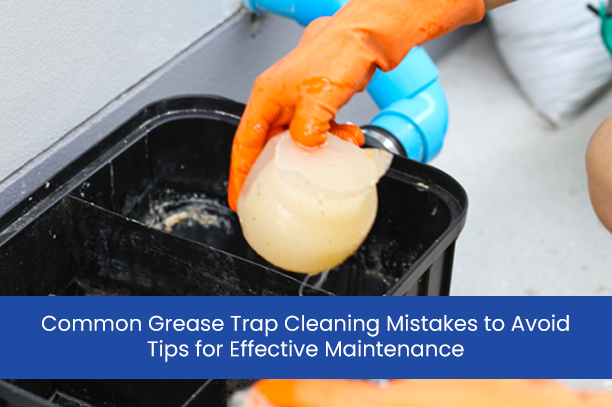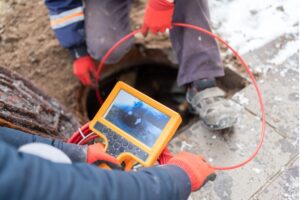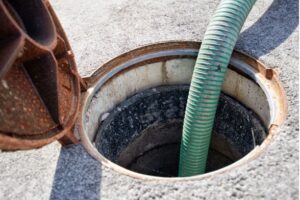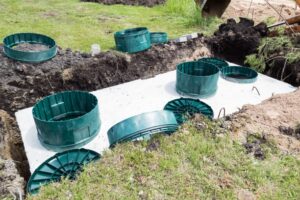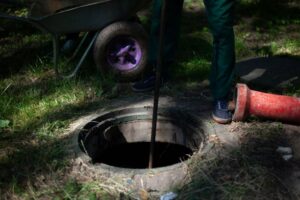For establishing any food service or business kitchen, the operator must maintain a clean grease trap. Fats, grease, and oils can harm a grease trap leading to potential clogs and costly repairs. Therefore it is essential to go for grease trap cleaning on a regular basis. However when it comes to oil trap maintenance and upkeep, many firms inadvertently commit mistakes that might cause inefficiency and future issues. In this blog, we’ll examine some typical grease trap cleaning errors and offer insightful advice for efficient upkeep. You can ensure the longevity and ideal operation of your grease trap, abide by environmental requirements, and reduce unnecessary expenses by being aware of and avoiding these dangers. Let’s get started and discover how to maintain your grease and the mistakes you need to avoid during Grease Trap Cleaning in Lehigh Acres.
Understanding Grease Traps and Their Function
In commercial kitchens and food service places, grease traps are crucial elements. In order to keep fats, oils, and grease (FOG) from contaminating the grease trap; they are made to gather and remove FOG and wastewater. Grease trap cleaning in Bonita Springs, FL aids in avoiding obstructions, clogs, and pricey plumbing troubles by doing. Grease traps must be properly maintained and cleaned in order to function effectively and in accordance with local laws.
Common Grease Trap Cleaning Mistakes
- Inconsistent Cleaning routine: It’s a common mistake to forget to create and adhere to a regular grease trap cleaning in Captiva. Depending on how much FOG the establishment produces, grease traps need to be cleaned and maintained on a regular basis. Lack of consistency can cause excessive grease buildup, which can cause odors, backups, and decreased trap effectiveness.
- Improper Grease Disposal: Another error to avoid is improper grease disposal. Grease shouldn’t ever be thrown down the drain or dumped into the grease trap. . In accordance with requirements, grease should be collected in approved receptacles and properly disposed of. Ineffective disposal can clog the trap and harm the environment.
- Grease trap maintenance should never be neglected between cleanings, a mistake some facilities often make. The walls and baffles of the trap should be regularly inspected and maintained to remove grease, solid particles, and debris buildup. If this maintenance is neglected, the performance of the trap may suffer, and more frequent and expensive cleanings may be required.
- Using the wrong cleaning techniques: Using the wrong cleaning techniques is a regular error. When cleaning grease traps in North Cape Coral, harsh chemicals, high-pressure water jets, or mechanical tools should be avoided. These techniques have the potential to harm the trap, move solid objects around, and drive grease deeper into the plumbing system. Grease traps should be cleaned with the right methods and environmentally safe goods, as advised by experts.
- Failure to Educate and Train Staff on Grease Trap Maintenance: This is another error that is frequently made. The importance of proper grease disposal, how to spot a full trap, and what to do in the event of a malfunction should all be known to staff members. The chance of mistakes and carelessness is decreased by enlisting the help of every worker in grease trap maintenance.
You can make sure your grease trap works well and lasts a long time by being aware of these typical grease trap cleaning errors and taking preventative measures to avoid them. Maintaining and grease trap cleaning in Naples in compliance with standards, keeping your plumbing in good working order, and fostering a tidy and productive workplace are all benefits of proper maintenance.
Tips for Effective Grease Trap Maintenance
You can take the following advice into account in order to ensure effective grease trap cleaning:
- A consistent cleaning schedule for your grease trap should be established based on the size and usage of your establishment. Maintain strict adherence to the timetable of grease trap cleaning in Naples to avoid excessive grease accumulation and to ensure optimal trap operation.
- Grease disposal best practices: Grease should never be flushed or poured down the drain. Gather the grease in the designated containers and make plans for its legal disposal in accordance with local laws. This avoids jams and harm to the environment.
- Perform routine inspections: Check your grease trap cleaning in Captiva on a regular basis in addition to scheduling cleanings. Verify the area for accumulations of grease, solid particles, and trash in order to maintain the trap’s effectiveness in between expert cleanings and remove any buildup.
- Use the proper cleaning techniques: When cleaning the grease trap, stay away from using harsh chemicals, high-pressure water jets, or mechanical instruments. These techniques run the risk of damaging the trap and pushing grease deeper into the plumbing. Use approved cleaning methods and eco-friendly cleaning supplies instead.
- Staff education and training: Make sure the personnel you hire are properly trained in grease trap cleaning in Naples. See if they value correct grease disposal, have complete knowledge about the symptoms of a full trap, and what to do in the event of a problem. You may avoid mistakes and carelessness by involving a professional entire crew.
- You may efficiently maintain your grease trap, avoid plumbing problems, and assure regulatory compliance by using the advice in this article.
Conclusion
For industrial kitchens and food service facilities to run well, grease traps must be properly maintained and cleaned. You may ensure the best performance and longevity of your grease trap by avoiding typical grease trap cleaning blunders, such as irregular cleaning schedules, poor grease disposal, neglecting maintenance in between cleanings, employing the wrong cleaning methods, and failing to train workers.
When it comes to grease trap maintenance, consistency is essential. The efficiency of the grease trap can be preserved by establishing a regular cleaning schedule based on the size and usage of your establishment and sticking to it religiously. Make careful to collect and dispose of grease in approved containers because proper grease disposal is essential to preventing clogs and environmental impact. For over 40 years, Crews Environmental has been providing services in your area. Our team believes in transparency and providing quick services to clients. The team is at your service 24 hours a day, 365 days a year. Contact us today to book your appointment today.

